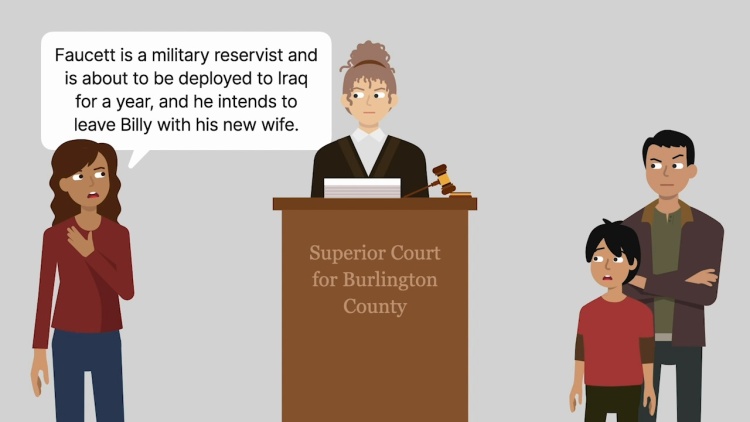Faucett v. Vasquez
New Jersey Superior Court, Appellate Division
984 A.2d 460 (2009)
- Written by Brittany Frankel, JD
Facts
Andrew Faucett (plaintiff) and Darianna Vasquez (defendant) were married in 1997 and had one child, Billy. Faucett and Vasquez divorced in 2001, and in 2002, the court entered a custody order. The custody order granted Faucett and Vasquez joint legal custody, named Faucett as the custodial parent, and granted Vasquez liberal visitation. Faucett remarried, and Billy’s new stepmother took on a parenting role. Faucett was in the United States military, and he received notice that he was scheduled to be deployed in February 2009 for approximately one year. In January 2009, Vasquez sought transfer of custody via an order to show cause and argued that she provided the preferred living arrangement for Billy due to Faucett’s impending deployment. Vasquez argued that she did not need to establish a change in circumstances affecting Billy’s welfare, because she was presumed to be entitled to custody of Billy over his stepmother due to the parental-preference doctrine. In response, Faucett argued that not only did Vasquez have an unstable living arrangement, but the dispute was between Faucett and Vasquez as two natural parents, not Vasquez and the stepmother. The judge entered an order of dismissal and concluded that there was no need for a change of custody to immediately occur. However, the judge increased Vasquez’s parenting time and ordered a custody evaluation, after which either party could petition the court for modification of the order. Vasquez appealed.
Rule of Law
Issue
Holding and Reasoning (Messano, J.)
What to do next…
Here's why 907,000 law students have relied on our case briefs:
- Written by law professors and practitioners, not other law students. 47,100 briefs, keyed to 996 casebooks. Top-notch customer support.
- The right amount of information, includes the facts, issues, rule of law, holding and reasoning, and any concurrences and dissents.
- Access in your classes, works on your mobile and tablet. Massive library of related video lessons and high quality multiple-choice questions.
- Easy to use, uniform format for every case brief. Written in plain English, not in legalese. Our briefs summarize and simplify; they don’t just repeat the court’s language.





